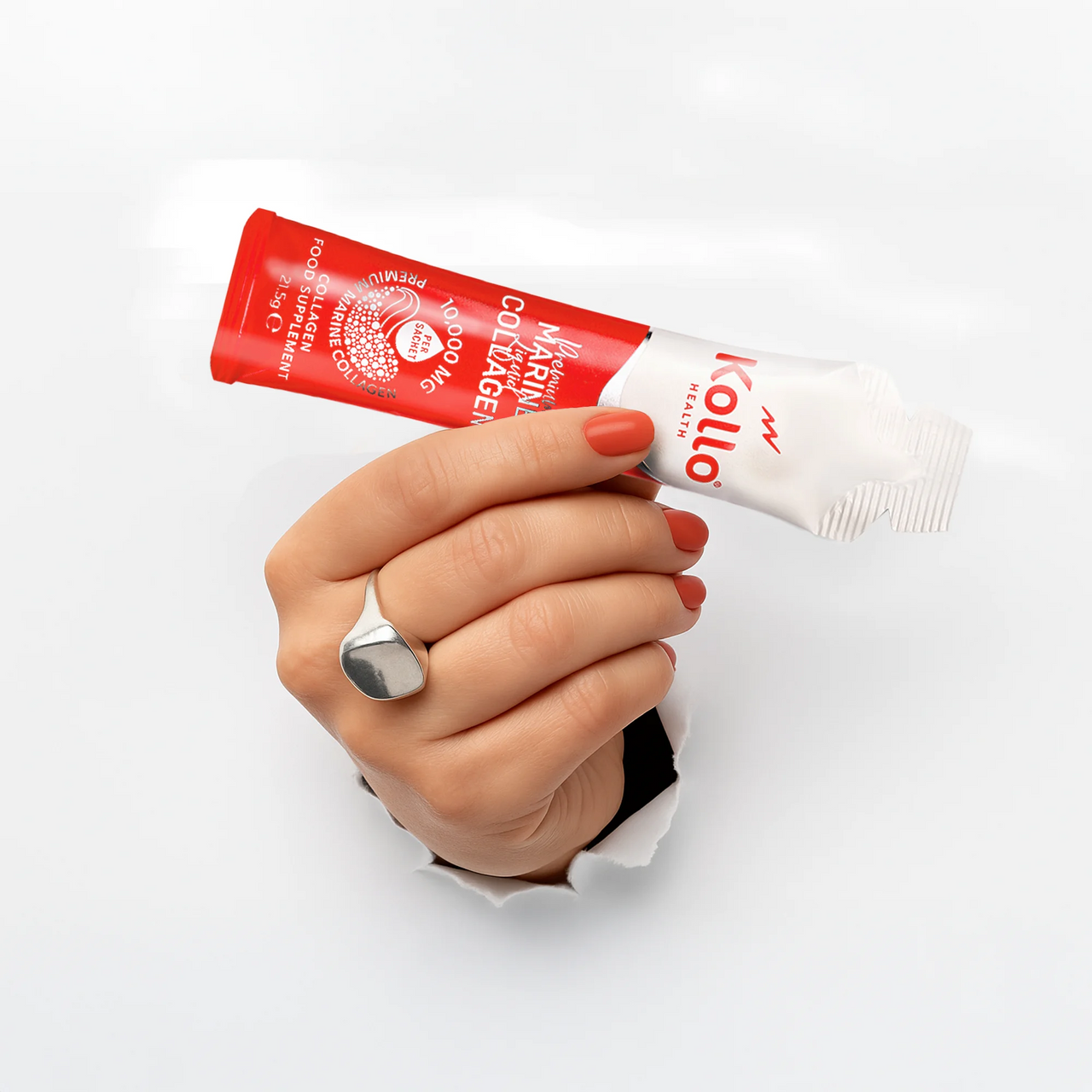In the past, many have made the mistake of dismissing menopause as something that isn't worth worrying about until you reach your 50s. Many make little effort to educate themselves on what to expect or to learn if there is anything they can do to prepare. As that time approaches, some women feel a sense of dread while others celebrate it as a transition into the next stage of life. Read on to find out more about collagen for perimenopause.
Understanding Perimenopause: A Time of Transition
Perimenopause is the period of time that leads up to the onset of menopause. It is likely to affect around 50% of women at some point, and it comes with a number of potential symptoms:
- Fatigue and lethargy
- Difficulty sleeping
- Hot flushes
- Brain fog
- Anxiety
- Mood swings
- Changes in skin, hair, bones, and joints
The Hormonal Shifts: A 'Second Puberty'
The hormonal changes are so extreme that some experts dub the process as a 'second puberty.’ With the potential for so many side effects, perimenopause and menopause can be a very difficult time for women, and it needs to be talked about.
Thankfully, there is a growing movement among prominent figures in society, like celebrities, to shine a light on perimenopause. Women with a platform are starting to talk about the symptoms they are experiencing and working to generate a better understanding of society. With a growing number of perimenopausal and post-menopausal women speaking out, there is a general sense of empowerment through knowledge and understanding of the changes a woman's body goes through. This way, we can all become more aware of this transitional time and the things that can be done to support it, increasing the feeling of validation and preparation.
The Menopause Milestone: What It Really Means
'Menopause' actually refers to just a single day: the 12-month anniversary of your final period. On average, this happens around the age of 51. But it usually comes after years of perimenopause symptoms, which can start in a woman's forties. Some women even begin to experience hormonal shifts as early as their mid-thirties - often undetectable - which initiate the whole process in the long term.
Only around 1% of women will experience menopause at or before the age of 41, but this life-changing transition can take anything up to a decade to reach completion.
The natural ageing process cannot be stopped, but there are things we can do to make the journey a little smoother. There are various supplements and dietary changes to explore for women experiencing perimenopause and the associated symptoms, and collagen is high on that list.
In this article, we will give you some guidance on how collagen works to ease many of the health and cosmetic issues associated with this change.
Common Symptoms of Perimenopause
As you move through the menopausal transition, you will encounter various changes in your body. Some will be subtle, and some will be a little more pronounced. You may experience:
- Irregular periods: Ovulation becomes increasingly unpredictable. You may experience a mix of longer and shorter spaces of time between periods. Your flow may be unusually light or heavy, and some periods may not happen at all.
- Changes in mood: Perimenopause can lead to irritability and an increased risk of depression. This is often associated with sleep disruption, though the hormonal changes could also be a contributing factor.
- Hot flushes and sleep disruption: Hot flushes are an extremely common symptom of perimenopause. This can often cause sleep problems due to night sweats. However, sleep can sometimes be unpredictable, even without hot flushes.
- Declining collagen levels: The drop in oestrogen in your body can reduce its ability to synthesise collagen. This may cause the signs of ageing to accelerate. You might find:
- Skin loses elasticity
- Wrinkles form
- Nails become brittle
- Hair thins at a faster rate than before
- Loss of bone density: The declining oestrogen can also result in you losing bone faster than you can replace it. This makes the bones more fragile and increases your risk of developing osteoporosis.
- Increasing cholesterol levels: Another unwelcome side effect of the decline in oestrogen is that it may lead to unwanted changes in your blood cholesterol. This could mean an increase in the presence of ‘bad’ cholesterol in your arteries or that the ‘good’ cholesterol levels drop. In either case, you could be at an increased risk of heart disease.
Why Do People Recommend Collagen for Perimenopause?
The term ‘perimenopause’ means ‘around menopause’. It relates to the time in a woman’s life when her body makes the transition to menopause. This transition can start at different ages for different women — some may notice changes in their mid-thirties, while others may begin in their forties.
During perimenopause, the level of oestrogen (the main female hormone) rises and falls unevenly. This can cause menstrual cycles to lengthen or shorten, and some menstrual cycles may fail to release an egg. The fluctuating hormone levels can also cause other symptoms of menopause. These include sleep issues, hot flashes, and vaginal dryness. This can be a difficult time for women, and there are lots of treatments available to ease the various symptoms when they arise.
One of the key factors contributing to these symptoms is the close relationship between oestrogen and collagen. Oestrogen is essential not only for sexual and reproductive health but also for maintaining bone health, nourishing blood vessels, and supporting heart function. When oestrogen production slows, it directly impacts collagen synthesis, which is crucial for various bodily systems.
Collagen is a vital protein that supports skin elasticity, joint health, bone density, gut health, and the strength of hair and nails. As we age, collagen production naturally declines, leading to symptoms such as poor joint repair, loss of skin firmness, thinning hair, and reduced bone density. Unfortunately, the drop in oestrogen levels during perimenopause accelerates this decline in collagen, with studies showing that as much as 30% of dermal collagen can be lost in the first five years after menopause. After that, the rate of reduction is around 2% per menopausal year.
To counteract these effects, collagen supplements—taken orally in the form of liquids, powders, or tablets—are often recommended. These supplements provide your body with the basic amino acids needed to boost collagen synthesis, addressing the problems associated with collagen loss. Additionally, maintaining a healthy lifestyle by avoiding smoking, managing stress, ensuring proper nutrition, and staying hydrated can help preserve collagen levels and support overall well-being during this transition.
Collagen for Perimenopause: How It Can Help
Perimenopause is marked by a decline in oestrogen levels, which in turn leads to a reduction in the body’s ability to produce collagen. This decline in collagen contributes to many of the symptoms associated with perimenopause, including changes in skin elasticity, bone density, and overall joint health.
Collagen supplementation can help address these symptoms by providing the body with the necessary amino acids to boost collagen synthesis. Here are some specific ways you might benefit from taking collagen during perimenopause.
Collagen and Skin Elasticity
The decrease in oestrogen associated with perimenopause can lead to reduced skin elasticity, resulting in fine lines, sagging, and wrinkles. Supplementing with collagen can help improve skin hydration and elasticity, as shown in a 2015 double-blind study that demonstrated substantial improvements in women aged 45-64.
Mood Regulation and Collagen
Collagen has been shown to promote brain health by interacting with cells to support cellular growth, which can help regulate mood swings commonly experienced during perimenopause. This is great for mental health and may yield benefits with regard to mood swings associated with perimenopause.
Collagen and Weight Management
One of the common complaints associated with menopause is weight gain. With no changes in diet or lifestyle, the weight starts creeping up all by itself. It is possible to address this by making some diet and lifestyle adjustments, but collagen supplements can also be a helpful tool. There have been promising results in animal studies that indicate collagen can lead to increased levels of satiety, which is a great way to help keep your weight down.
Promoting Healthy Sleep With Collagen
Collagen contains a lot of the amino acid glycine. This is a known inhibitory neurotransmitter that calms the central nervous system. It can help us unwind, relax better, and fall asleep more easily. Getting plenty of sleep is very important for your mental and physical health. It may even lead to other health benefits for symptoms associated with perimenopause.
Collagen Helps Your Heart Health and Cholesterol
Healthy arteries require suppleness to function their best, and collagen provides this. The risk of atherosclerosis — one of the leading causes of death in the human population — increases after menopause. There is evidence that collagen supplements may play a role in preventing and even treating atherosclerosis, supporting good health in the circulatory system.
Collagen gives structure to your arteries and veins. Studies have shown that collagen supplements can maintain the suppleness of arteries. They may even help increase the levels of good cholesterol in your body. In turn, this can reduce your risk of developing heart conditions.
Boosting Your Endogenous Collagen
The oestrogen decline brought on by perimenopause can cause your natural collagen levels to decline. Consequently, you may experience a wide range of issues relating to ageing. Collagen supplements can help replenish the body’s natural collagen levels, reducing and even reversing some signs of ageing, leading to healthier skin, hair, nails, and joints. This can make you look and feel younger and healthier. In turn, this can boost your confidence and generally improve your energy levels.
Collagen and Bone Density
Collagen is the primary constituent of bone mass, making up an impressive 90% of the organic content of bones. This protein is crucial for the strength and flexibility of bones, while minerals contribute to their stiffness. During perimenopause, the reduction in both collagen and oestrogen levels can lead to a significant decrease in bone density, increasing the risk of chronic conditions like osteoporosis.
Many studies have shown that collagen peptides can increase the organic substance of bone. When perimenopause makes your bone mass reduce too quickly, your risk of chronic conditions like osteoporosis increases. Collagen supplements may help make up for this deficit. Over time, they can help restore bone density to a healthier level and thus protect against the risks of frail bones.
Gut Health and Hormone Balancing With Collagen
At the time of writing, the scientific research into supplementation for these areas is in its infancy. But there is still cause for hope in this area, as it has been hypothesised that collagen is important for both gut health and hormone balancing. Just as the hormones change, the gut microbiome fluctuates throughout the different stages of life. Collagen is a factor in healing and sealing the gut thanks to its glycine and glutamine amino acids.
There is lots of space for more studies relating to perimenopausal and menopausal women to unveil the true potential of collagen. But the knowledge we have so far is enough to indicate that it can support the transition into the next phase of life by supplying the body with fuel to combat some of the damaging consequences of the change.
The Most Bioavailable Collagen for Perimenopause
If you are taking collagen for perimenopause symptoms, you need it to be fast-acting, high-quality and effective. In other words, you need it to be highly bioavailable. What this means is that the collagen peptides in the supplement you take are easy for the body to absorb in large quantities.
The collagen needs to come in a hydrolysed form. This means breaking down the large collagen molecules into smaller amino acid chains that are easy to absorb. The process of hydrolysis needs to be one that doesn’t harm the integrity or purity of the amino acids within. Additionally, you want to ensure the dosage of the collagen is high enough to deliver the benefits you aim to get from it.
Marine collagen is the most bioavailable form of animal collagen, as opposed to bovine or porcine collagen. It is a Type I collagen, which is by far the most abundant in our bodies. Moreover, it closely mirrors the molecular structure of the collagen found in human bodies.
Marine collagen comes from the skin and scales of fish, and it is the type of collagen that we put into every sachet of Kollo Health’s liquid marine collagen. Our supplement comes from aquaculture-farmed fish. This means the animals come into contact with minimal toxins that might otherwise contaminate the all-important protein. That collagen is extracted using enzymatic processes so that no harmful chemicals interact with it. Additionally, the hydrolysis process used is very clean and efficient.
This maintains the maximum purity and integrity of the resulting collagen peptides. Other benefits of our collagen include:
- 10 grams of collagen peptides in every serving. This is enough to deliver all the benefits associated with collagen supplementation.
- Suspended in a liquid form, further increasing the bioavailability of the collagen peptides.
- Fortified with B vitamins, vitamin C and l-lysine. This strengthens your body’s uptake of the amino acids and ability to synthesise new collagen.
- Easy to incorporate into your daily routine. Simply empty a sachet into water and mix for a delicious and nutritious daily serving of collagen.
Final Thoughts on Collagen for Perimenopause
There can be many benefits to taking collagen for perimenopause symptoms. They generally relate to the issues around the fact that midlife and menopause cause our natural collagen levels to drop. Replenishing what you lose can help with these issues. But you will only achieve it by taking a high-quality collagen supplement. This means one that offers the necessary dosage of collagen peptides in a highly bioavailable form.
Kollo Health’s collagen delivers exactly what you need. You can learn more about our product by exploring our blog section. You can also read our customer reviews and look at the scientific studies into collagen supplementation. Take a moment and browse the information available on our website. If you still have questions, please don’t hesitate to contact us; someone from our team will endeavour to answer them.







